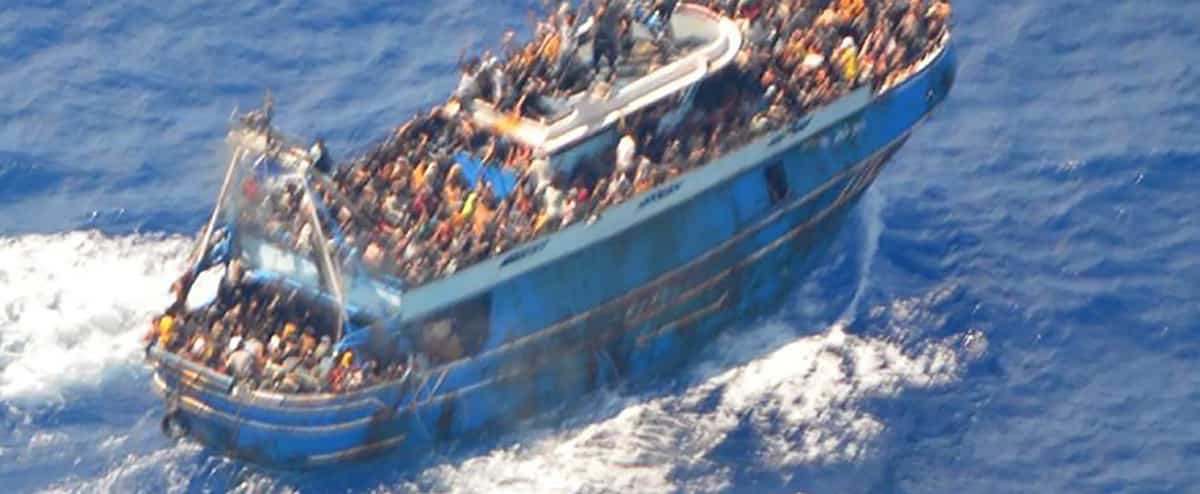Two weeks after a refugee boat sank off the coast of Greece, leaving hundreds missing, five survivors met by AFP near Athens have accused coastguards of a lack of will to rescue.
Since the tragedy, however, the Greek government has shifted sole responsibility to the smuggling networks.
“The real responsibility lies with the criminal gangs who filled the boat with desperate people (…) without even giving them life jackets,” Greek Prime Minister Kyriakos Mitsotakis said in Brussels on Thursday.
Away from the Greek police, who scrupulously control access to the Malakasa refugee camp north of Athens, Hassan, a 26-year-old Syrian refugee, does not hide his anger at the Coast Guard, whose slow intervention was denounced on June 14 by NGOs and the media.
“I didn’t get the impression at all that the Greek coast guard wanted to rescue us,” he laments.
He is one of 104 men, including many Syrians, rescued by the Coast Guard after the fishing boat went down.
According to their statements, there were between 600 and 750 passengers on board, including women and children in the hold of the boat who could not be rescued.
“I don’t know exactly how many there were, but we heard their screams, their screams,” recalls Ahmad, a 27-year-old Syrian.
At least 82 people drowned and hundreds more disappeared when this trawler, leaving Libya for Italy, capsized on June 14 before sinking 47 nautical miles from Pylos (south) within 15 minutes.
This sinking raised many questions about the responsibility of the Greek authorities.
“It wasn’t an accident”
The Coast Guard gave only fragmentary information about the conditions of the sinking. A judicial investigation into the causes of this tragedy has been launched in Greece.
On Monday, the European Border Agency said Athens had ignored an offer of additional air support from Frontex.
According to the five survivors interviewed, ropes were thrown at their distressed boat twice by the Coast Guard to tow them away. The rope let go the first time.
The second time, “the rope from the military boat was attached to the bow, and it suddenly started zigzagging very quickly, creating waves.” That’s when the boat capsized,” says Salim, a 28-year-old Syrian.
This exile, who, fearing for his safety, asked for anonymity like the others, went so far as to accuse the Coast Guard of premeditated action: “It wasn’t an accident!”
According to the Council for Refugees (GCR), between 35 and 40 survivors reported the same events as the Coast Guard towed the boat with a cable.
“Why did you tow the boat? We must await the results of the investigation,” notes Lefteris Papagiannakis, director of the GCR, but points to a glaring delay in the rescue operation.
On the morning of June 13, passengers from this derelict boat alerted the NGO alarm phone before two commercial boats in the area brought them water and food.
According to the Greek government, “the coast guard had also approached the boat, they threw a rope to stabilize it, but the migrants refused to help”.
When asked by AFP about the progress of the Coast Guard operation, the Navy Department replied that “these questions are part of the investigation being conducted, which is being conducted under strict confidentiality.”
inflatable boats
According to survivors, a drone and a helicopter hover over the vehicle.
“The engine completely died just before midnight (June 13). After that, the Greek Coast Guard arrived,” notes Ahmad.
At around 2 a.m. local time (2300 GMT) on June 14, Salim jumped into the water after the trawler capsized. He’s still wearing his steaming watch on his wrist.
“The Coast Guard watched us from afar for at least 10 minutes before sending two inflatable boats to help us,” he continues, tears in his eyes.
Azad, 21, swam for an hour to reach the Coast Guard boat. “Some who couldn’t swim wanted to hold on to us, we had to think about their survival,” he says, moved.
Before this tragedy, Salim had already experienced hell in Libya: “I was spent eight months in hangars where we were crammed with dozens of people,” describes this Syrian from Deraa, the bastion of rebellion against the regime.
“I don’t know why I survived all this…” says Rukayan, a Kurd from Kobané in Syria who is haunted by the images of the shipwreck. Her 17-year-old cousin is missing.
After the third day at sea, water and food began to run out. “Two people died of thirst, others drank sea water,” says his friend Hassan.

